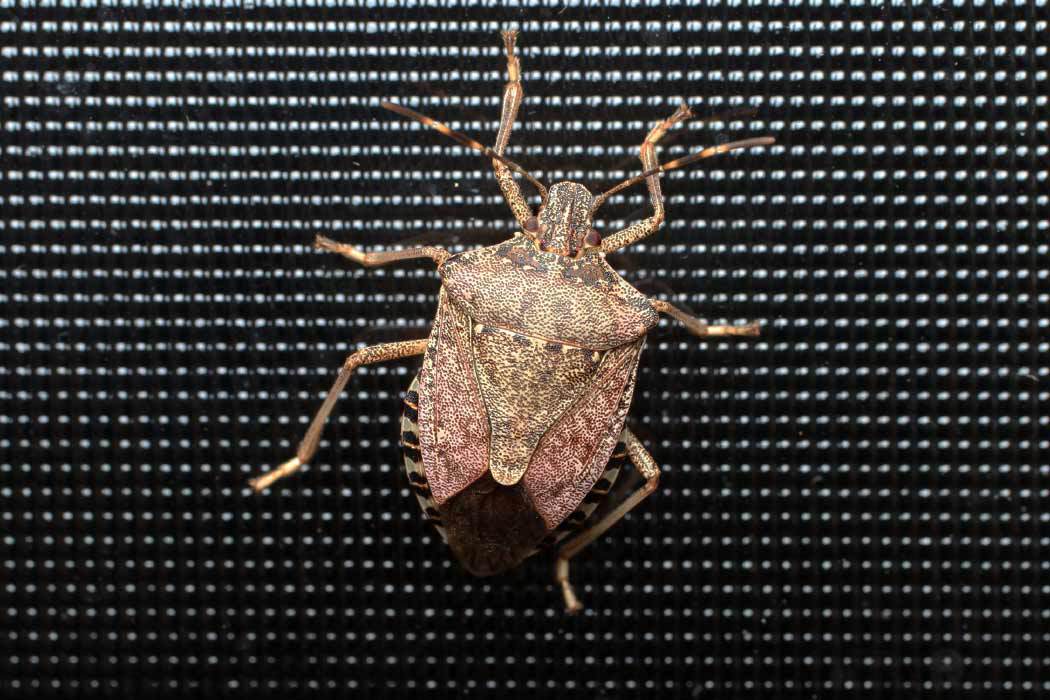
The brown marmorated stink bug (BMSB) poses a serious biohazard threat to both Australia and New Zealand. Both countries have implemented new seasonal import regulations to combat this risk that may impact your shipments. Reduce potential delays and impediments by keeping up to date with changing requirements and understanding the packaging and treatment requirements for your specific commodities.
What is the brown marmorated stink bug?
Originally native to Asia, the BMSB was accidentally imported to North America in the late 1990s, and to some European countries after 2000. Since then, the BMSB has been detected and has spread in more than 40 countries.
Feeding on more than 300 plant species, the BMSB often invades vehicles, homes, and factories in large numbers during autumn, looking for shelter over winter. In addition to decimating crops, these pests pose a potential and severe biosecurity risk as they secrete a smelly chemical when threatened that can cause a burning sensation with skin contact. In fact, their smell is an aeroallergen that can cause allergic reactions in some people.
Australia’s BMSB regulations
In Australia, the Department of Agriculture, Fisheries, and Forestry (the Department) has published new seasonal measures for the BMSB risk season, running from 1 September, 2022, to 30 April, 2023. The Department updated the measures to combat the biohazard risk BMSB poses to shipments entering Australia. Here’s a high-level list of the BMSB requirements for Australia.
- All shipment goods must be packaged and presented in a manner that allows for effective BMSB treatment to be conducted.
- All packaged goods must allow for heat or fumigation treatment to reach all internal and external surfaces.
- If goods are plastic wrapped, the wrapping must be adjusted or slashed to allow for adequate access for the fumigant or heat to infiltrate and achieve an effective treatment.
- The seasonal packaging guidelines are only applied to the goods being imported, not the packaging materials.
- Packaging materials such as cardboard, plastic, and timber packaging or pallets will not be subject to BMSB measures. However, all packaging materials must meet non-commodity requirements.
Australia deems that any vessel that tranships or loads goods from risk countries is subject to heightened vessel surveillance on arrival in Australia. For the full list of the target risk goods, visit the Department’s BMSB website.
New requirements this year
Here’s what’s new:
- Following detections of BMSB in the last season, China and the UK have been identified as emerging risk countries. Goods imported from these countries that classify to Tariff heading 94 (Furniture) and 95 (Toys, Games, and Sports requisites) will be subject to random verification inspections. Random inspections will apply to goods shipped from China between 1 September to 31 December (inclusive) and goods shipped from the UK between 1 December to 30 April (inclusive).
- All Breakbulk, flat racks, and open top containers (including in gauge) must be treated offshore prior to arrival in Australia.
- The 120-hour fumigation policy has been amended for break bulk goods including flat racks and open top containers that have been rolled. Previously, cargo must be loaded onto a vessel for export from the target risk country within the defined timeframe of 120 hours. This has been amended to allow for situations where the goods were unavoidably rescheduled and loaded onto another vessel. An additional allowance of 48 hours outside of the 120-hour post treatment is provided in instances where evidence is provided.
- Inspect (unpack) Inspections instead of Secure Seals intact inspections at approved arrangements.
Selecting a treatment provider
Australia has updated their list of registered BMSB treatment providers in 18 countries ahead of the 2022-2023 BMSB season. Be sure your treatment provider is an approved one.
Some goods will require mandatory offshore BMSB treatment prior to arrival in Australia, including all high-risk goods, goods shipped as break bulk, in open containers, or on flat rack containers, and goods that are shipped between 1 September, 2022, and 30 April, 2023.
To see the full list of offshore providers, visit the Australian BMSB website.
New Zealand’s BMSB regulations
The New Zealand Ministry for Primary Industries (MPI) has released its own regulations to combat BMSB during the peak risk season. There are some similarities between regulations in Australia and those set in New Zealand, there are also some areas where the regulations differ.
MPI strongly encourages importers to conduct offshore treatments before arriving in New Zealand. To assist importers, MPI has a manufactures declaration template which includes information on which goods meet the BMSB management exclusion criteria and allow for user modification where required. To view or download the declaration template visit the New Zealand MPI website.
The cost of non-compliance
Non-compliance with the set packing or treatment regulations will likely cause severe delays and potentially inaccurate treatment, resulting in the exportation of your shipment once arriving in Australia or New Zealand
If you are unsure if your shipment meets BMSB standards, visit the Department’s BMSB website or MPI’s website.
Minimise delays during BMSB season
While BMSB regulations may add steps to your import process, there are ways to minimise delays for your high-risk goods or goods travelling from risk countries.
First, provide early and accurate documentation for your shipments. This includes all details of treatment procedures and packaging information. Accurate information up front can speed up any inspection processes for your freight.
Second, attempt to complete all BMSB treatments offshore and prior to arriving in Australia or New Zealand. And be ready for your customs officials to check your treatment certificates. This can help you avoid treatment backlogs at Australia and New Zealand ports.
Finally, whenever possible, work with shipping and import experts to help navigate current and changing requirements. Our Trusted Advisor® experts are ready and able to discuss your specific risks and help establish your next steps for a smooth, seamless BMSB season. Connect with an expert today to get started.



